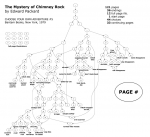Some posts, threads etc have triggered this question in my mind:
In the context of 5e, GM "judgement calls" can also fall into the domain of "rulings not rules."
By railroading I mean the GM shaping outcomes to fit a pre-conceived narrative. (This is broader than some people use it, I know. If the players get to choose for their PCs, but what they choose won't change the downstream storyline, I am counting that as a railroad.)
My feeling is that the answer is a complex one.
In a FRPG session I ran yesterday, the action was in a bedroom in a mage's tower, where a wizard had been lying unconsciousness on a divan recovering from a terrible wound, but then was rather brutally decapitated by an assassin. One of the players, whose PC ran into the room just as the decapitation took place, asked whether there was a vessel in the room in which the PC could catch the decapitated mage's blood.*
I resolved this by setting a DC for a Perception check - and because, as the player argued with some plausibility, it was likely that a room for convalescing in would have a chamber pot, jug/ewer, etc - I set the DC fairly low. The player succeeded, and the PC was able to grab the vessel and catch the blood as desired.
Setting the DC is a judgement call. Depending whether it is set high or low, the action is likely to unfold one way or another - so setting the DC definitely matters to what is likely to emerge as downstream story.
But I don't see it as railroading. The issue of whether or not the blood might be caught in a vessel had not even occurred to me until the player raised it. And there was no preconception, on my part, of any ultimate destination for the action.
On the other hand, had I decided simply that the room contains no vessel, because I had already decided that I didn't want the storyline to include shenanigans with a blood-filled chamber pot, I think that would count not only as a judgement call, but as one that has a railroading effect.
I'm guessing, though, that there are other posters who would see one or both cases differently from me!
[size=-2]* If you want to know why, the answer is in this thread.[/size]
[size=+1]How do GM "judgement calls" relate (if at all) to railroading?[/size]
In the context of 5e, GM "judgement calls" can also fall into the domain of "rulings not rules."
By railroading I mean the GM shaping outcomes to fit a pre-conceived narrative. (This is broader than some people use it, I know. If the players get to choose for their PCs, but what they choose won't change the downstream storyline, I am counting that as a railroad.)
My feeling is that the answer is a complex one.
In a FRPG session I ran yesterday, the action was in a bedroom in a mage's tower, where a wizard had been lying unconsciousness on a divan recovering from a terrible wound, but then was rather brutally decapitated by an assassin. One of the players, whose PC ran into the room just as the decapitation took place, asked whether there was a vessel in the room in which the PC could catch the decapitated mage's blood.*
I resolved this by setting a DC for a Perception check - and because, as the player argued with some plausibility, it was likely that a room for convalescing in would have a chamber pot, jug/ewer, etc - I set the DC fairly low. The player succeeded, and the PC was able to grab the vessel and catch the blood as desired.
Setting the DC is a judgement call. Depending whether it is set high or low, the action is likely to unfold one way or another - so setting the DC definitely matters to what is likely to emerge as downstream story.
But I don't see it as railroading. The issue of whether or not the blood might be caught in a vessel had not even occurred to me until the player raised it. And there was no preconception, on my part, of any ultimate destination for the action.
On the other hand, had I decided simply that the room contains no vessel, because I had already decided that I didn't want the storyline to include shenanigans with a blood-filled chamber pot, I think that would count not only as a judgement call, but as one that has a railroading effect.
I'm guessing, though, that there are other posters who would see one or both cases differently from me!
[size=-2]* If you want to know why, the answer is in this thread.[/size]

